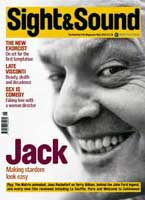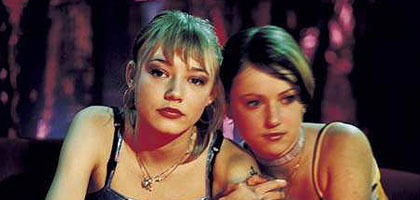
Lilya 4-ever
Sweden/Denmark 2002

Reviewed by Tony Rayns
Synopsis
Our synopses give away the plot in full, including surprise twists.
Bruised and bleeding, 16-year-old Lilya (Oksana Akinshina) runs through a suburb of Malmö to a bridge over a motorway...
Three months earlier, somewhere in the former Soviet Union, Lilya looks forward to emigrating to the US with her mother (Ljubov Agapova) and stepfather-to-be Sergei (Tönu Kark), only to be left behind at the last moment. She becomes the ward of her aunt Anna (Lilia Sinkarjova), who moves her to a squalid, smaller apartment, saying she can't afford the rent on the mother's place.
Regularly skipping school, Lilya starts hanging with a group of noisy, glue-sniffing kids and edges into a friendship with the homeless 14-year-old Volodya (Artiom Bogucharskij). One night at a disco Lilya's friend Natasha (Elina Benenson) prostitutes herself. But when her father finds the money, Natasha claims that it was Lilya who'd turned to prostitution; Lilya is stuck with the bad reputation and ostracised by all her former friends, except Volodya. She learns from social services that her mother has written from the US formally to disown her, and discovers that Anna had taken over her mother's apartment.
Lilya begins prostituting herself and soon meets the personable Andrei (Pavel Ponomarjov), who offers her friendship and gifts without demanding to sleep with her. As they begin dating, Andrei suggests moving together to Sweden, promising to find her a job there. Lilya asks him to find work for Volodya too, but finally leaves without the boy. Volodya kills himself as soon as she is gone. Flying alone on a fake passport (Andrei promised to follow her), Lilya is met on arrival in Sweden by Witek (Tomas Neumann), who locks her into a bare apartment in Malmö. After raping her himself, Witek begins pimping Lilya to a succession of middle-aged men. One day she finds that Witek has forgotten to lock her in...
She runs through the streets to the bridge over the motorway and throws herself to her death.
Review
After two domestic and international hits, Lukas Moodysson reaches that tricky third feature and stumbles nearly as hard as the Gallagher brothers did with the third Oasis album. Lilya 4-ever takes a tabloid-agenda issue, the traffic in young women from the former eastern bloc to the brothels of western Europe, and blends it with the child's-eye perspective Moodysson used so successfully in Show Me Love and Together. But, where it made good sense to look at small-town boredom and adults tying themselves up in political and emotional knots from the point of view of kids, it seems a lot less shrewd to use the strategy in this case. To focus on the appalling experiences of one abused child is to wallow in victimhood. It says nothing more useful than: isn't this shocking? Aren't we powerless to do anything about it?
Fassbinder spent a large part of his middle career wrestling with the melodrama of victimhood: how can a film-maker express empathy with a victim-figure and retain the distance necessary to mount a credible social and political critique? Moodysson simply flunks this challenge. Lilya is a brattish Russian teenager, formed by her tough environment, but ultimately a tabula rasa. Thrown against her are serried ranks of two-dimensional villains: her selfish mother, a hooker who struck lucky and will stop at nothing to emigrate with her fancy man; her even more selfish aunt Anna, a new Wicked Witch of the East; her 'best friend' Natasha, who transfers guilt from herself without a flicker of conscience; the seemingly kindly Andrei; the casually brutal Witek; the anonymous Swedish men who screw her... The list is virtually endless. It's obvious within minutes that the poor girl doesn't stand a chance in this limitlessly cruel world. Sure enough, 100-odd minutes later, she throws herself off a Swedish flyover and dies, dreaming of a reunion with feisty little Volodya, her one true friend. D.W. Griffith would have felt right at home with this plot.
The limitations of the melodrama aside, Moodysson makes two staggering aesthetic miscalculations. First, he gives cute little angel wings to Volodya when he shows up in Lilya's dreams in the closing scenes, and Lilya gets a pair herself in her dying reverie. This relates to a framed picture which is initially Lilya's most treasured possession, a painting of a large, winged angel guiding/protecting an innocent child, but it plays as sentimental nonsense: there's no suggestion that Lilya ever thinks of herself or of Volodya as angels. It's entirely spurious to project this image into Lilya's mind.
Second, the use of soundtrack music is even more glib and tendentious than it was in his previous films. While Nathan Larson's original score tends to the shamelessly religiose, Moodysson repeatedly takes other music (mostly techno from the disco scenes) and cranks it up to obliterate all other sound. The most extreme case is his use of Rammstein's 'Mein Herz brennt', played at woofer-challenging volume over the opening and closing scenes. We're clearly supposed to understand that the lyrics somehow 'speak for' Lilya (it's her heart that's burning), but the device seems hopelessly inorganic. Even if we take the volume as a metaphor for the girl's wish to block out the world, it's absurd to imagine that Lilya would ever relate to or even listen to a Rammstein track in German. So the wall of sound comes from some 'higher' version of MTV, not from the character or story.
Moodysson is obviously right that the issues of failed parenting, teenage homelessness and prostitution and human trafficking need to be addressed. Many of them, of course, were addressed two decades ago in such films as Ulrich Edel's Christiane F. (1981), a Europe-wide hit in its day just as Lilya 4-ever has been in Sweden. And they're still being addressed in greatly superior films such as Garin Nugroho's Leaf on a Pillow (Daun Di Atas Bantal, 1998), which tackles the lives of street-kids in Yogyakarta without phoney empathy or tabloid outrage. Moodysson is great with actors, especially kids, and clearly has his finger on the pulse of filmgoing liberals. But to claim him as "the most interesting helmer working in Scandinavia today" (Variety) seems pretty far-fetched.
Credits
- Director
- Lukas Moodysson
- Producer
- Lars Jönsson
- Screenplay
- Lukas Moodysson
- Director of Photography
- Ulf Brantås
- Editors
- Michal Leszczylowski
- Oleg Morgunov
- Bernhard Winkler
- Art Director
- Josefin Åsberg
- Music
- Nathan Larson
